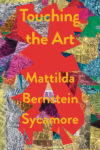 Jennine Capó Crucet’s debut novel, Make Your Home Among Strangers, follows a Cuban-American first-generation college student, Lizet Ramirez, through her first year at an elite university in the northeast. While this new chapter of Lizet’s life is exciting, it’s also confusing and startlingly different from her former life in Miami. She can’t help but feel guilty for leaving Little Havana where her sister is raising a newborn, her father has recently left their family, and her boyfriend is struggling to understand her new life. Lizet also feels distant from her mother, who’s become obsessively involved in the plight of a young boy named Ariel Hernandez, the sole survivor from a raft of Cuban immigrants trying to reach Miami. As the battle for Ariel’s custody becomes national news, Lizet finds it increasingly difficult to define her own identity while keeping a foot in these two very different worlds.
Jennine Capó Crucet’s debut novel, Make Your Home Among Strangers, follows a Cuban-American first-generation college student, Lizet Ramirez, through her first year at an elite university in the northeast. While this new chapter of Lizet’s life is exciting, it’s also confusing and startlingly different from her former life in Miami. She can’t help but feel guilty for leaving Little Havana where her sister is raising a newborn, her father has recently left their family, and her boyfriend is struggling to understand her new life. Lizet also feels distant from her mother, who’s become obsessively involved in the plight of a young boy named Ariel Hernandez, the sole survivor from a raft of Cuban immigrants trying to reach Miami. As the battle for Ariel’s custody becomes national news, Lizet finds it increasingly difficult to define her own identity while keeping a foot in these two very different worlds.
In addition to this humorous and heart-wrenching novel, Crucet has published the story collection How to Leave Hialeah, which also explores issues of inclusion and exclusion, and is set in the predominantly Cuban neighborhoods of South Florida. Born in Miami and raised by Cuban parents, Crucet has her own firsthand experience of creating new homes in unfamiliar places. Most recently, she moved from Tallahassee, Florida to Lincoln, Nebraska, where she is currently an assistant professor of English and Ethnic Studies at the University of Nebraska. Crucet is an absolute pleasure to talk to—warm and funny and delightfully prone to slipping into personal confessions. Over the phone, we discussed the notion of home, the art of fictionalizing historical events, and the philosophy of moving toward what you fear.
Liz Wyckoff: So much of this book is about feeling like a stranger in a new place. Do you feel at home in Nebraska yet or does it still feel a little strange?
Jennine Capó Crucet: This book came out as I was starting a new job and moving to a brand new city and state and [making] completely different life choices. And I have to say, the irony has not been lost on me. Lizet is a very different person from me, but she has this gut feeling that she’s supposed to go [to Rawlings College]. And I remember hearing about this job and being like, Oh boy, time to move to Nebraska. Not that I was cocky about it, but I just had this feeling that I was supposed to be here and that it was going to be a good thing. If there’s any time in my life when I thought this novel would be instructive for me in my heart, it would be right now.
You grew up in Miami, where half of this novel is set, and then moved away. How would you describe your attachment to Miami now?
I’m so conflicted about Miami. My honest answer is that it doesn’t feel like the city I grew up in. It’s recognizable, but it has changed a lot. There’s all of this really cool shit happening in Miami now—a huge art scene, a huge literary scene—and I’m weirdly jealous that I didn’t have it growing up. I want to be part of that scene, but I feel like it came about while I wasn’t there, so I don’t know how much right I have to enter into it. As much as I feel like I’m part of the Miami literary scene, I have to be part of it from a distance.
I’m really proud of how the city is finally embracing the intense creativity and awesomeness that comes out of it. I just wish that I had been nurtured by that somehow. I wish that the formal things that have sprung up in the last ten years had happened ten years earlier. But they probably couldn’t have, because it’s my generation of people making them. And that came out of a lack. So I guess I just feel bad that I was somewhere else for a decade. Now I’m like, Hey can I hang out? Can I come back? I’m from here, too.
When you’re writing about the city, do you travel back and get re-immersed in the scene, or do you feel like most of it is coming from your memories?
Definitely from memory. When I start thinking about Miami, I realize I’m thinking about late-90s, early-2000s Miami. I’m sort of stuck in my relationship to Miami during my college years. I’ve come to really love my college experience [at Cornell] in hindsight, but at the time, I felt like I was in this lame town and I didn’t know what to do with myself. Everyone [there] prides themselves on how hard they work and how little sleep they get and, at the time, I felt like that wasn’t the right place for me. Though, now I think it totally was.
[When I was writing this book,] I was in a place in my life where my imagination would revert to that time period often. I realized I was doing that and I worried about being complacent and stagnant in my work. And now it’s time to shake things up. That’s part of why I left a good job and started somewhere else. I was going toward the fear. This next novel that I’m working on is going to require so much of me and a year ago, I wasn’t in a place in my life where I could write this book. But now I’m scared to death and I’m ready. I have no choice. I’m ready to go after it in a new way.
The story of Ariel Hernandez in your book is not exactly the story of Elián González, but very close to it. Was there ever a point where you thought you might do the research and stay historically accurate? Why did you decide to fictionalize it?
I feel the same way about this particular issue that I feel about the whole writing of the book, which is that at some point I was like: I am in charge, and I can do whatever I want. It was the best feeling in the world. I did do quite a bit of research. I went to this crazy museum—this house-turned-museum—down in Little Havana and spent the day talking to someone who claimed to be [Elián’s] great-uncle’s best friend’s cousin kind of deal. And I did watch a lot of the documentary to refresh my memory of that time. I was doing what any writer does: putting myself back in a place so that I could write. I made the choice to fictionalize it early on when I realized I wasn’t writing an Elián González novel. I was writing a Lizet Ramirez novel.
In some interviews and reviews, the Elián González stuff has been referred to as a subplot. I don’t see it as a subplot, because I think without Ariel Hernandez and this fictionalized version of an immigration crisis, you don’t have a novel. That’s sort of the inciting incident. Without it, I do think Lizet would come to learn all of the things she eventually learns—just maybe more slowly, and with a little more thoughtfulness, and less fear, right? It would have taken four years instead of one. But she was in a pressure-cooker because of [Ariel Hernandez].
And pressure-cookers are great for a plot.
Yeah! And that’s what I realized. This is a novel. This is a made-up thing, and as much as I’m drawing on this thing that really happened, I’m not writing about that thing. Once I decided that, [the writing] was so much more fun and so much easier. Also, I had no excuse anymore to avoid it, to be like: I have to watch one more documentary about this. Nope. I didn’t. It was just time to go.
So at that point, I really limited the research. Once I figured out what I was trying to say, what these characters were trying to say, I didn’t care what really happened. Even [the fact that Ariel Hernandez got deported] was not because there was a parallel to Elián González. It was just what the novel demanded. I knew it couldn’t have happened any other way. And that was an interesting way for me to think through my own feelings about that time in history. Like, why did we think anything else could have happened? Of course this was going to go badly. And you can see the legacy of [Elián González’s deportation] on our immigration system now. It’s very broken. That was fifteen years ago and it’s broken in many of the same ways now, so that’s depressing.
I think this book will be really helpful for first-generation college students to read. Some people have already written in their reviews that this would be a great book to add to a curriculum, and I definitely agree. I know you spent time counseling first-generation students in your job at One Voice in Los Angeles. What kind of work did you do there and how did that influence you?
When I worked at One Voice, my title was technically College Advisor, but it’s an entire social services agency. They provide wraparound services. So they don’t take a student into the program, they take a whole family into the program. [For example,] if a kid’s dad loses his job while the kid is in school, sometimes the family calls the kid and says: “We need you to come home so you can work a part-time job and help us out. You have to quit college.” They sometimes don’t realize that there’s a long-term investment that they’re making by sending their kid off to school. Instead, [One Voice] steps in, and they pay rent until the parent’s able to get work back. They’re able to step in, the way an aunt or uncle would, and be like: Don’t worry. I got this. Let me pay the rent, pay for the utilities, whatever. The kid needs to stay in school. We’ll help out the family until you guys get back on your feet. Let’s help you find another job. And let’s make sure your papers are in order so that you can be legal to work in the country, etc., etc.
It was a fantastic organization. It was the best place I’ve ever worked. I’ve never felt more that I was making a tangible difference in the world on a day-to-day basis than when I worked there. And for that reason, it was the biggest threat to my writing career that I’ve ever had. Every day I was happy. But I knew I would never finish another book if I stayed there—partly because of time, but partly because it really fulfilled me in the same way that writing does. I took a hard look at myself and asked: Could someone else do this job as well as me? Absolutely. But could someone else write the book that I want to write and the books that I want to write? Nope. So that was it. That was the choice.
What advice would you give to a first-generation college student who is maybe one of the only people of color in his or her school and having an experience similar to Lizet’s?
There were so many things I wanted to say to those kids all the time. It’s what made me write this book. I would realize that platitudes and advice always felt worthless without the experience [of getting through school] having happened yet. And so, something I said often was: “You’re incredibly special and wonderful and brilliant and you can do this, but it’s going to suck in a lot of ways. I’m not going to lie to you about that.”
I would talk about how a college education, sending someone off to college, breaks the cycle of poverty in a family. But you have to get through it. I would say: “No one coming after you, as far as your siblings that go to school or any kids you have, will ever have to go through the shit you’re going to go through. You have that extra load on you and it’s not fair. You will always have hang ups and you’ll never be able to talk to your parents the same way again and you’re going to look back at your life in ways that are really painful. But you can do it. And no one else in your family can. You are so strong and so powerful and so brilliant that you can be the one who does this for your family.”
And I would say: “Look for people like me for the rest of your life. Because this is a really weird position to be in, but when you find someone else who’s done it, those are the friendships that last forever.”
Looking back, what kind of message would you give to your eighteen-year-old self?
I would say: “Stop fighting the fact that you’re a writer. Just stop fighting that. And congratulations that you’ve figured it out. So just go with it and don’t try to do other things, too.” So much of my college [experience] was spent trying to find the “respectable” thing to do that would make my parents proud and make them feel like my college education was an investment. I would say to my eighteen-year-old self: “This is an amazing investment and you won’t be the writer that you’re going to be without this school and these teachers. And that is actually really valuable. You finally have access to this. Just go hard. Don’t be scared of it.” I would say: “Just embrace where you’re at. You’re going to be a writer and not only is that worthy of this education, it is the whole point of why the universe brought you here.”
Liz Wyckoff’s short fiction has been published or is forthcoming in Copper Nickel, Quarterly West, and The Collagist, among other journals, Her book reviews and author interviews have appeared in Covered With Fur, The Rumpus, Electric Lit, and Tin House online. She currently lives in Madison, Wisconsin.
This post may contain affiliate links.







